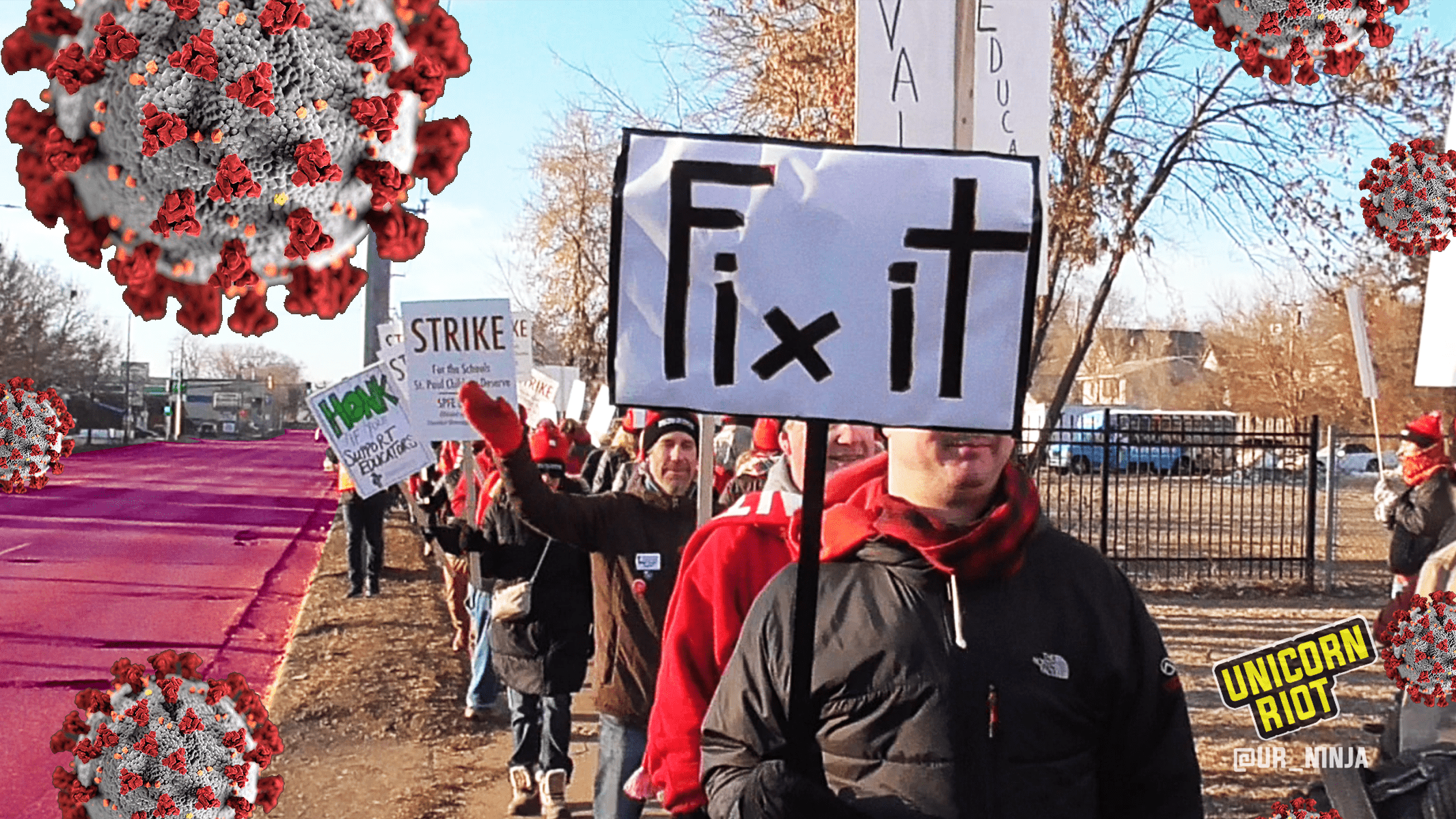Coronavirus Concerns End St. Paul Educators Strike, Close Many Public Schools
St. Paul, MN – After a 19+ hour negotiating session beginning at 8:00 a.m. Thursday morning, a tentative agreement was reached between Saint Paul Public Schools (SPPS) and the St. Paul educators’ union around 3:30 a.m. on Friday, March 13 — the same day Minnesota Governor Tim Walz declared a peacetime emergency to battle the COVID–19 pandemic.
Nick Faber, president of the Saint Paul Federation of Educators Local 28 (SPFE), said in a Friday press conference that the ongoing COVID–19 novel coronavirus crisis was a strong motivator for teachers to end the strike early.
Faber explained, “We’ve watched a global pandemic start to descend, from both sides of the country, towards the midwest […] had it not been for the coronavirus, we would hope we would’ve been able to do better.” The first coronavirus case in Ramsey County was reported on March 6, 2020.
In a SPFE statement published on March 13 Faber expressed frustration with how district leaders had “decided to play politics with a national health crisis.” He claimed SPPS had chosen “digging in at the bargaining table” over prioritizing the needs of students and educators.
“Only an unprecedented pandemic and concern over the health and safety of our students and staff stopped St. Paul educators from fighting harder and longer for more resources for our children.” — SPFE President Nick Faber, March 13, 2020
Faber explained that SPFE didn’t want a situation where, due to the pandemic, “members were quarantined out while they were on strike, and therefore without pay and without leverage as well.”
Saint Paul Federation of Educators Local 28 (SPFE)’s top priority was increased mental health support staff in every building. SPFE’s Friday press release announced that they had won more nurses, social workers, psychologists, and intervention specialists.
Other important bargaining points were also reportedly won, including increased multilingual staff and the district-wide expansion of restorative justice practices “to build positive school climates and help end the school-to-prison pipeline.”
Details of the new two-year contract will be made public once the rank-and-file membership has formally ratified the tentative agreement.
One of the dropped proposals would have made Election Day a school holiday, which the union asserted would have promoted voting participation among its members in addition to making SPPS buildings “more available and accessible to be polling places.” Click here to view SPFE’s bargaining proposal tracker.
Classes are set to resume for all SPPS students on Monday, March 16.
States’ education departments differ on plans for coronavirus pandemic
St. Paul’s school systems are remaining open at this time despite the ongoing pandemic.
In a COVID–19 statement to families, the district remarked that closing schools “has a disproportionate impact on parents/families, school staff, and students who rely on school to meet their basic needs.” The announcement pointed out that if schools are closed, young people “will congregate in other places” where they may not be safe from the spreading novel coronavirus.
“Current evidence does not show that closing schools is effective in limiting the spread of COVID-19.” — SPPS website, Friday, March 13
The district asserted on March 13 that there have been no confirmed cases of COVID–19 in either SPPS stuff or students. Governor Walz and Minnesota State Health Commissioner Jan Malcom emphasized that the closure of public schools in other states has not stopped the spread of the virus there.
The public school district of Minneapolis, the larger of the Twin Cities, published its own statement on Thursday, March 12 about COVID–19. The statement said Minneapolis Public School district is “aware of the growing concerns around COVID-19 (coronavirus)” and recommended the cancellation of after-school activities, but was not advising the total closure of the public school system at this time.
“Both the Minnesota Department of Education and the Minnesota Department of Health are recommending that schools not be canceled.” — statement from Minneapolis Public Schools, March 12, 2020
The national Center for Disease Control (CDC) has published considerations for school closures. According to the CDC, short-term school closures haven’t necessarily been effective at stopping the spread of COVID–19; other mitigation efforts such as proper hand-washing have more of an impact on both the spread of the virus and health care measures.
Read the CDC’s recommendations below.
CDC Considerations for School ClosureMany Midwestern states shutter schools due to public health threat
In the United States, each of the 50 states has its own department of education, which results in dozens of independently-orchestrated plans regarding public education in the state.
As of Saturday, March 14, here are what upper midwestern states currently plan for public schools regarding the COVID–19 pandemic:
- Wisconsin Governor Tony Evers announced on Friday that public schools will be closed starting on Wednesday, March 18. This closure will last until at least April 6.
- Illinois Governor J.B. Pritzker stated that all public schools would be closed through Monday, March 30.
- Michigan Governor Gretchen Whitmer has closed all public schools through April 5.
- Although Iowa Governor Kim Reynolds has said that Iowa public schools will remain open, explaining that “Now is the time for schools to be putting their plans in place for when community spread occurs,” the school district of Iowa’s capital city of Des Moines has cancelled classes until at least Monday, March 30.
- Nebraska Governor Pete Ricketts is keeping public schools open for now.
- North Dakota Governor Doug Burgum said that public schools would remain open at this time.
- South Dakota Governor Kristi Noem has ordered that all public schools be shut down for at least one week, starting Monday, March 16.
The governor of every state listed in this article has declared a state of emergency in response to the rapid spread of COVID–19.
North of Minnesota, the Canadian provinces of Ontario and Manitoba have each had their own response.
In Ontario, Education Minister Stephen Lecce will be closing schools for three weeks, beginning March 14; some schools in Ontario have a Saturday School program. Manitoba Education Minister Kelvin Goertzen also announced that public schools will be closed for three weeks, but that closures would begin on Monday, March 23.
Unicorn Riot has been monitoring the COVID–19 outbreak since January. We will continue to report on this historic pandemic; stay tuned.
Update (March 15, 4:30 p.m. CDT): Minnesota Governor Tim Walz has ordered that all public K-12 schools be closed starting Wednesday, March 18 through at least Friday, March 27. A Dakota County teen who attends public school has been diagnosed with COVID–19, and as of this weekend three known person-to-person transmissions have occurred in the state.
Update (March 17, 1:30 a.m. CDT): Saint Paul Public Schools cancelled classes Monday and Tuesday ahead of the Governor’s mandated school closures. Beginning on Wednesday, March 18, school bus stops will be utilized as weekly food pickup spots where each child will be provided a 1-week supply of meals. Some families may request to have food delivered if meal pickups are not possible — click here for more information.
Update (March 26, 3:00 p.m. CDT): Minnesota schools will remain closed until May 4, by order of Governor Walz.
Follow us on Twitter, Facebook, YouTube, Vimeo, Instagram, and Patreon.
Please consider a tax-deductible donation to help sustain our horizontally-organized, non-profit media organization:



